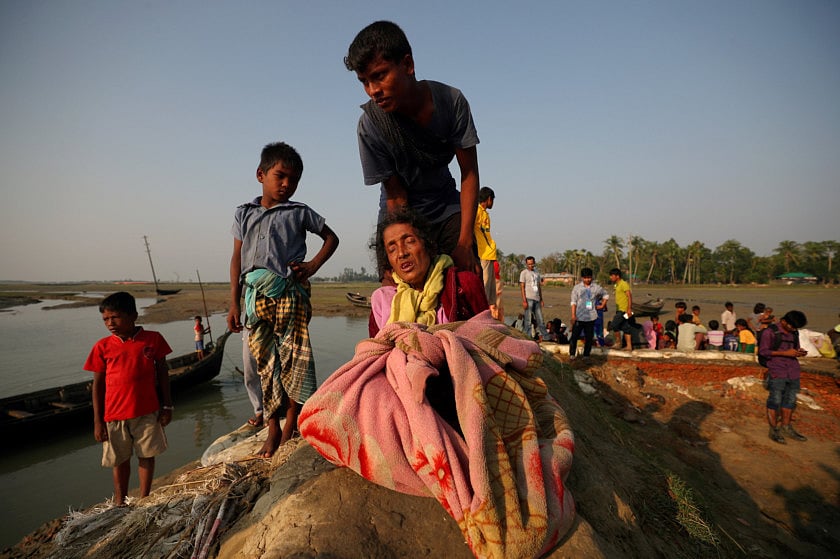On the other side of the world, 600,000 people are crouching in the mud, shivering with terror, telling the same stories of how a husband was shot, a sister was raped, a baby was thrown on a fire — stories multiplied tens of thousands of times. They’ve been forced out of their homes by soldiers who mocked them, beat them, torched their houses. The whole point of this state-sponsored campaign of terror — for that’s exactly what it is — was to drive the hapless across a nearby border into a neighbouring country, which can’t really afford to harbour hundreds of thousands of refugees, since it is already one of the poorest in the world. (Close to a million Rohingya now live as refugees in Bangladesh; 600,000 of them arrived since August.)
The terror is still going on in Myanmar. Right now — even though there aren’t a lot of people left in their homes to terrorise. And that has left some of us who follow this situation to ask a simple question: Is it time to use the word “genocide”?
The people I’m talking about are the Rohingya, who are sometimes referred to as “the most persecuted people on the face of the earth”. The government of the country they used to live in, known as Myanmar (aka Burma), hates them so much that it even stripped them of their citizenship 35 years ago. I remember many people from Myanmar telling me, during my last visit a few years ago, that the Rohingya were just vermin, not truly human at all. After all, didn’t I know that they had really, really dark skins? And that they were Muslim — not at all like the majority Buddhists?
And it’s true, the Rohingya don’t have a lot of friends right now — but that has more to do with geopolitics than imagined personal traits.
It’s about finally raising our voice, a powerful voice that everyone in the world listens to. The United States can demand and orchestrate sanctions against Myanmar’s military and government. It can organise pressure in international bodies. And it can demonstrate its visible opposition to those responsible and its support for the refugees.
Now here’s a thought: Americans have always prided themselves on straight talk. What if the United States government were to come straight out and officially designate what’s happening to the Rohingya as a “genocide”? That could potentially transform how the rest of the world discusses the issue. Genocide is defined as “a coordinated plan of different actions aiming at the destruction of essential foundations of the life of national groups, with the aim of annihilating the groups themselves”.
That is a pretty good description of current state policy towards the Rohingya. Thousands, perhaps tens of thousands, have already been killed; we don’t know precisely how many, since the government of Myanmar isn’t allowing independent witnesses into the area.
What’s eminently clear is that Myanmar’s military is doing its best to drive these poor, stateless people out of the country and never let them back in again. And once that’s done, the foundations of Rohingya life in Myanmar will be over. Their refugees will be scattered among the nations that host them, but their life in Myanmar will be beyond reconstruction. Myanmar will have “finally solved the Rohingya question”, to paraphrase a certain German statesman.
Isn’t this something that our country, at least, should go on the record as opposing?
But I get it, of course. Americans have so many other important things to focus on: The next game, the next phone, the next episode of their favourite show. Why should they have to worry about things that are happening in faraway countries, to people we don’t even know? Don’t we have a right to be — unbothered?
— Washington Post
Christian Caryl is an editor with the Post’s Global Opinions section.
Sign up for the Daily Briefing
Get the latest news and updates straight to your inbox
Network Links
GN StoreDownload our app
© Al Nisr Publishing LLC 2026. All rights reserved.
